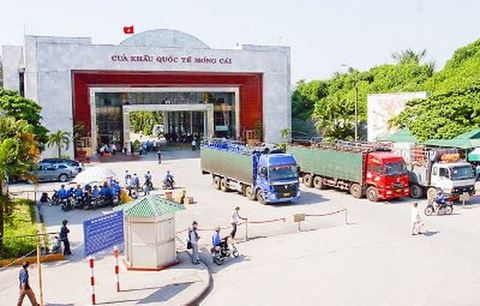
Trucks carrying Vietnamese agricultural produce for export to China at the Mong Cai border gate in the northern province of Quang Ninh. — Photo kinhtedothi.vn
Viet Nam has for the first time ever become China’s biggest trade partner in the ASEAN bloc, with two-way trade hitting over US$10 billion for every month of 2018.
In June 2018, China-Viet Nam economic turnover hit $11.2 billion, dwarfing the $9.3 billion between China and Malaysia, which has held the title of China’s largest ASEAN trade partner for several years, said Economic and Commercial Counsellor of the Chinese Embassy in Viet Nam Hu Suo Jin during a press conference held on Thursday on bilateral economic ties.
In the first half of this year, bilateral trade grew by 28.8 per cent compared with the same period last year, higher than the 15.5 per cent growth rate achieved between China and Malaysia, the runner-up in the ASEAN bloc.
Hu Suo Jin stressed that this has been the “historic best period” in economic ties between the two countries, and Viet Nam’s trade deficit with China is being worked on by both countries’ agencies.
The Chinese embassy’s trade official also said it has worked with border provinces’ authorities to facilitate the import of Vietnamese agricultural produce into China.
“The reported jams at the border gates were not due to a lack of policy mechanisms by the two countries’ authorities, but simply due to overwhelming growth rate of commodity exchange between China and Viet Nam,” Jin said.
Charge d’affaires of the Chinese Embassy in Viet Nam Yin Haihon also announced that there will be several high-level visits made in the latter half of the year, and pledged that the embassy will do its best to encourage capable Chinese enterprises to invest in Viet Nam.
Thermopower concerns
Also present at the press conference, Chen Lienqing, a representative from the State-owned China Southern Power Grid (CSG), responded to press queries on recent reports of black smoke billowing out of the chimney of Vinh Tan 1 thermopower plant in the southern province of Binh Thuan.
CSG, the main investor of the $1.75 billion power project in Viet Nam, said the phenomenon was the result of blowing highly compressed air to clean the chimney, before the trial run of the second unit.
“It’s also not smoke and it does not contain any toxic substances. The residue inside the chimney was blown up to 30m but quickly fell down to just 10m around the chimney and was quickly collected,” Chen said.
On account of the black smoke, Binh Thuan Province People’s Committee on Wednesday asked Vinh Tan 1 power plant to suspend its trial runs of the second unit, saying that the plant has not notified the Ministry of Environment and Natural Resources or local authorities of its operation plan.
According to the province’s authorities, the trial runs will only be resumed once the environment ministry acknowledges that the plant’s environment protection facilities are working in order.
Provincial authorities also demanded the Vinh Tan company submit a detailed plan on its treatment of ash and slag in line with the Ministry of Industry and Trade (MoIT) guidelines – which include planting trees around the tightly sealed ash impoundment sites and cleaning of ash on trucks going in and out of the plant.
CSG’s representative reiterated that the Vinh Tan 1 power project is the first to have been built by a Chinese investor under the Build-Operate-Transfer (BOT) model, after 25 years of operation, the power plant will be transferred to the Vietnamese Government.
All environmental protection measures have been carried out “at the highest standards set by the two countries” since its construction and the company “welcomed” inspection and monitoring by concerned authorities and local media, Lienqing said.
Coal-fired thermopower plants are receiving mounting criticisms around the world over their environmental impact.
Vinh Tan 1 company, however, claimed that it uses Viet Nam’s high purity anthracite coal, which generates 20,000 tonnes of carbon dioxide less than other thermopower plants.
The 1,240MW Vinh Tan 1 is expected to generate more than 7.2 billion kWh of electricity per year, increasing the southern region’s electricity supply capacity and helping reduce its dependence on hydropower, especially in the dry season or during droughts. — VNS